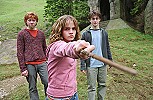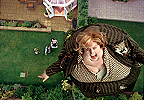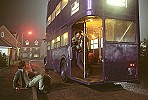









Citizenship Issues
|
Human RightsThroughout the Harry Potter stories, we see Harry as a happy boy at school but an unhappy boy at home with his relatives, the Dursleys. He is often the victim of verbal abuse and has to endure repeated insults towards his dead parents. All around the world there are children who are bullied, ignored, abused, hurt, made to feel worthless or forced into doing things that are unsafe. In 1989, the UN extended the convention on human rights to include a separate charter dedicated to children’s rights as it felt that “childhood is entitled to special care and assistance.” The treaty has since been ratified by every country in the world, with the exception of the USA and Somalia (both of which have indicated their intention to ratify by formally signing the Convention)
Laws that protect us Find out more about Amnesty's Human Rights Education resources and Amnesty UK's Education resources
Abuse Harry is shouted at and pushed by Uncle Vernon. He gets verbal abuse from Aunt Petunia. His uncle says that Harry is sent to St Brutus’ school for hopeless cases, where they use the cane.
Should children who are ‘hopeless cases’ be included in schools? Harry is taunted for not being able to return to school and having nowhere else to go. He is used as a servant. Discuss power relationships. Uncle Vernon is the adult. Does he take advantage of his position? Harry is luckier than many children as Vernon is scared of his magic abilities. What could he do if he couldn’t threaten Vernon with his wand?
Insulted family Harry is continually being told by his family that he is worthless. What are the effects of this? What defence mechanisms does Harry develop to help him cope with life at home? The Convention stresses the importance of family and supports its status as the preferred environment for children to grow. “The child should grow up in a family environment, in an atmosphere of happiness, love ad understanding.”
The Convention also states that children should be free from punishment or discrimination as a result of their parents’ activities, beliefs etc. Harry is continually ‘punished’ by the Dursleys because his parents were wizards. What other examples can you think of that might cause you to be teased or bullied?
Homelessness After an argument with his aunt and uncle, Harry packs his trunk and runs away from home. What does he feel? What do you think you would feel like? Where would you go? Does Harry know where he is going? Imagine you’ve run away from home. If you were homeless, where would you go? What would you do? Who do you think would help you? Write a postcard home describing your feelings. Investigate homelessness. Why do young people leave home or run away?
A silent voice Near the end of the film, when Dumbledore is talking with Harry, Hermione and Ron in the hospital wing, Dumbledore explains to the children that their word about Sirius’ innocence will not be enough. He says:
The Rights of the Child Convention says that:
Discuss different opportunities for child voice e.g. pupil voice within school (school council etc), child voice within the family. Encourage pupils to become involved.
Where to go for help Childline and Samaritans will help people who have problems or just want to talk. Shelter help people who are homeless.
Activity: Design a poster advertising either ChildLine or the Samaritans.
|




